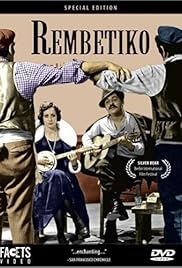REMBETIKO
(director/writer: Costas Ferris; screenwriter: Sotiria Leonardou; cinematographer: Takis Zervoulakos; editor: Yanna Spyropoulou; music: Stavros Xarhakos; cast: Sotiria Leonardou (Marika), Nikos Kalogeropoulos (Bobbi), Nikos Dimitratos (Panagis), Michalis Maniatis (Giorgakis), Themis Bazaka (Andriana), Konstantinos Tzoumas (Yiannis ‘Juan’), Giorgos Zorbas (Thomas); Runtime: 110; MPAA Rating: NR; producers: George Zervoulakos/Costas Ferris; Athos Films; 1983-Greece-in Greek/with English subtitles)
“The music is powerful.”
Reviewed by Dennis Schwartz
This gripping emotional musical fictionalized biopic, cowritten and directed by Costas Ferris (“Oh Babylon”/”The Murderess”), uniquely chronicles the story of Greece from 1917 to 1956 (it uses old newsreels to include the national disaster in Asia Minor, the two million refugees who came to Greece from Turkey by 1925, World War II, the Nazi occupation, and the Civil War) as it overlaps it with a tragic true personal story (highly embellished) about one of Greece’s most popular rembetiko singers–Marika Ninou’s (Sotiria Leonardou). Rembetiko singing is a particular Greek stylized form of “Urban Blues” that’s compared to the American blues as soul music for those who have a tale of woe. It originated in the hashish dens of Pireaus and Thessaloniki around the turn of the 20th century and was influenced by eastern elements that came with the forced immigration of 2 million Greek refugees from Asia Minor. In the 1950s it gave way to the Greek Popular Music (‘Laika’) which used the same instruments but surfaced from the underground and cleaned up its act.
Marika was born in Smyrna, Turkey, in 1917, and was deported to Greece along with all the other Greeks in Smyrna eight years later. Her abusive father Panagis and her unhappy and unfaithful mother Andriana were rembetiko players in unsavory hash clubs. The story follows the parents’ breakup, Marika having a bastard child, joining a rembetiko group as a singer, reaching popularity with a group led by Bobbi, her downfall and random murder by a crazed party reveler.
The film’s music is powerful and plays better than the sob story or the leftist history lesson. When the musicians play on their violins, fiddles, the turkish saz (a type of lute), the bouzouki and, its smaller brothers, the tzouras and the baglamas, and the singers belt out their melancholy songs, the film is bursting with life and is energized. The music gloriously tells you all you want to know about the hardships, joys, loves and fights for survival that a rembetiko singer had to endure.

REVIEWED ON 8/9/2007 GRADE: B+